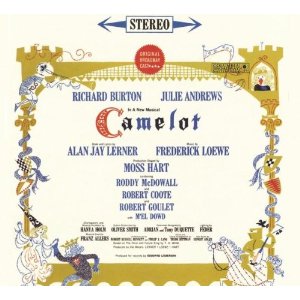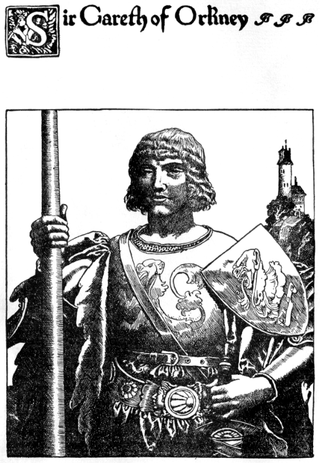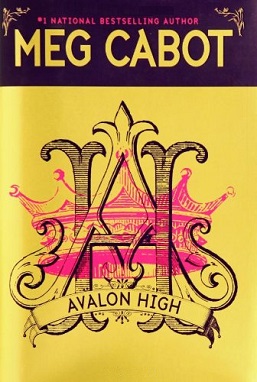Related Research Articles

Guinevere, also often written in Modern English as Guenevere or Guenever, was, according to Arthurian legend, an early-medieval queen of Great Britain and the wife of King Arthur. First mentioned in popular literature in the early 12th century, nearly 700 years after the purported times of Arthur, Guinevere has since been portrayed as everything from a fatally flawed, villainous and opportunistic traitor to a noble and virtuous lady. Many records of the legend also feature the variably recounted story of her abduction and rescue as a major part of the tale.

Mordred or Modred is a major figure in the legend of King Arthur. The earliest known mention of a possibly historical Medraut is in the Welsh chronicle Annales Cambriae, wherein he and Arthur are ambiguously associated with the Battle of Camlann in a brief entry for the year 537. Medraut's figure seemed to have been regarded positively in the early Welsh tradition and may have been related to that of Arthur's son. As Modredus, Mordred was depicted as Arthur's traitorous nephew and a legitimate son of King Lot in the pseudo-historical work Historia Regum Britanniae, which then served as the basis for the following evolution of the legend from the 12th century. Later variants most often characterised Mordred as Arthur's villainous bastard son, born of an incestuous relationship with his half-sister, the queen of Lothian or Orkney named either Anna, Orcades, or Morgause. The accounts presented in the Historia and most other versions include Mordred's death at Camlann, typically in a final duel, during which he manages to mortally wound his own slayer, Arthur. Mordred is usually a brother or half-brother to Gawain; however, his other family relations, as well as his relationships with Arthur's wife Guinevere, vary greatly.

The Lady of the Lake is a name or a title used by several either mermaid or mermaid-like but human enchantresses in the Matter of Britain, the body of medieval literature and mythology associated with the legend of King Arthur. She plays several important roles in many stories, including providing Arthur with the sword Excalibur, eliminating Merlin, raising Lancelot after the death of his father, and helping to take the dying Arthur to Avalon. Different sorceresses known as the Lady of the Lake appear concurrently as separate characters in some versions of the legend since at least the Post-Vulgate Cycle and consequently the seminal Le Morte d'Arthur, with the latter describing them as a hierarchical group, while some texts also give this title to either Morgan or her sister.

Excalibur is a 1981 epic medieval fantasy film directed, cowritten and produced by John Boorman, that retells the legend of King Arthur and the knights of the Round Table, based loosely on the 15th-century Arthurian romance Le Morte d'Arthur by Thomas Malory. It stars Nigel Terry as Arthur, Nicol Williamson as Merlin, Nicholas Clay as Lancelot, Cherie Lunghi as Guenevere, Helen Mirren as Morgana, Liam Neeson as Gawain, Gabriel Byrne as Uther and Patrick Stewart as Leondegrance. The film is named after the legendary sword of King Arthur that features prominently in Arthurian literature. The film's soundtrack features the music of Richard Wagner and Carl Orff, along with an original score by Trevor Jones.

The Knights of the Round Table are the legendary knights of the fellowship of King Arthur that first appeared in the Matter of Britain literature in the mid-12th century. The Knights are an order dedicated to ensuring the peace of Arthur's kingdom following an early warring period, entrusted in later years to undergo a mystical quest for the Holy Grail. The Round Table at which they meet is a symbol of the equality of its members, who range from sovereign royals to minor nobles.

Bedivere is one of the earliest characters to be featured in the legend of King Arthur, originally described in several Welsh texts as the one-handed great warrior named Bedwyr Bedrydant. Arthurian chivalric romances, inspired by his portrayal in the chronicle Historia Regum Britanniae, portray Bedivere as a Knight of the Round Table of King Arthur who serves as Arthur's marshal and is frequently associated with his brother Lucan and his cousin Griflet as well as with Kay. In the English versions, Bedivere notably assumes Griflet's hitherto traditional role from French romances as the one who eventually returns Excalibur to the Lady of the Lake after Arthur's last battle.

Camelot is a musical with music by Frederick Loewe and lyrics and a book by Alan Jay Lerner. It is based on the legend of King Arthur as adapted from the 1958 novel The Once and Future King by T. H. White.

Gareth is a Knight of the Round Table in Arthurian legend. He is the youngest son of King Lot and Queen Morgause, King Arthur's half-sister, thus making him Arthur's nephew, as well as brother to Gawain, Agravain and Gaheris, and either a brother or half-brother of Mordred. Gareth is particularly notable in Le Morte d'Arthur, where one of its eight books is named after and largely dedicated to him, and in which he is also known by his nickname Beaumains.

Bors is the name of two knights in Arthurian legend, an elder and a younger. The two first appear in the 13th-century Lancelot-Grail romance prose cycle. Bors the Elder is the King of Gaunnes (Gannes/Gaunes/Ganis) during the early period of King Arthur's reign, and is the brother of King Ban of Benoic and the father of Bors the Younger and Lionel. His son Bors the Younger later becomes one of the best Knights of the Round Table and participates in the achievement of the Holy Grail.

Merlin is a 1998 two-part television miniseries starring Sam Neill as Merlin, recounting the wizard's life in the mythic history of Britain. Loosely adapted from the legendary tales of Camelot, the plot adds the antagonistic Queen Mab and expands Merlin's backstory before the birth of King Arthur.
Dagonet is a Knight of the Round Table in Arthurian legend. His depictions and characterisations variously portray a foolish and cowardly knight, a violently deranged madman, to the now-iconic image of King Arthur's beloved court jester.
This is a bibliography of works about King Arthur, his family, his friends or his enemies. This bibliography includes works that are notable or are by notable authors.

Avalon High is a young adult novel by Meg Cabot, published in 2005 targeted for age 12 and up. The book merges a high school setting with elements of medieval fantasy, namely Arthurian legend.

The Mists of Avalon is a 2001 television miniseries based on the 1983 novel of the same title by Marion Zimmer Bradley. Produced by American cable channel TNT, adapted by Gavin Scott, and directed by Uli Edel, the series retells Arthurian legend from the perspectives of Morgan le Fay and other women of the tale. The first episode was the highest-rated original movie on basic cable in the summer of 2001.

The Knight of the Sacred Lake is a historical fantasy novel by Rosalind Miles. It was first published in 2000 by Simon & Schuster in the UK followed by Crown Books in the US. The book is a retelling of the Arthurian legend and follows the lives of Queen Guinevere, consort of King Arthur and her struggles with the king's nephews Agravain and Gawain; the queen is torn between her love for her husband, her land, and her lover, Lancelot. The book was part of a series, The Guinevere Novels, and was followed by The Child of the Holy Grail. Reviewing the book, Publishers Weekly described it as "a lush, feminist take on the English epic".

Adventures of Sir Galahad is the 41st serial released in 1949 by Columbia Pictures. Directed by Spencer Gordon Bennet, it stars George Reeves, Nelson Leigh, William Fawcett, Hugh Prosser, and Lois Hall. It was based on Arthurian legend, one of the very few serials of the time with a period setting that was not a western.

Arthur Rex: A Legendary Novel is a 1978 novel by American author Thomas Berger. Berger offers his own take on the legends of King Arthur, from the heroic monarch's inauspicious conception, to his childhood in bucolic Wales, his rise to the throne, his discovery of the great sword Excalibur, his establishment of the Knights of the Round Table, his long and honorable reign, and his heroic death in battle against the evil Mordred, his bastard son.

Avalon High is a 2010 American medieval fantasy film released as a Disney Channel Original Movie and starring Gregg Sulkin, Britt Robertson, Joey Pollari, and Devon Graye. The movie is loosely based on the 2005 book of the same name by Meg Cabot. It premiered on November 12, 2010, in the United States, January 22, 2011, in Australia and New Zealand, and January 28, 2011, in the United Kingdom.
References
- ↑ Jones, Anne; Whyte, Robert, eds. (2019). Eccentric voices: a scrapbook of Brisbane cultural history 1965-1995. ToadShow. ISBN 978-0-6485191-1-9. OCLC 1130085066.
- ↑ "Glamalot donates to AIDS Council". Brother Sister. No. 65. February 23, 1996.
- 1 2 3 ToadShow. Glamalot Program (1996). Print.
- 1 2 Cotes, Alison (January 25, 1996). "Relics revived for rewrite of history". City News: 8.
- 1 2 Houghton, Kris (January 7, 1996). "Knight moves". Sunday Mail Magazine: 3.
- ↑ Emerson, Scott (February 16, 1996). "Premier records one brief shining moment". The Australian: 2.
- ↑ Harris, John (July 27, 1989). "Chance to hit the big time". The Sun.
- ↑ Galloway, Paul (January 31, 1996). "Knight life". Brisbane News.
- ↑ Partridge, Des (January 20, 1996). "Raunchy knights you'll remember". The Courier-Mail: 18.